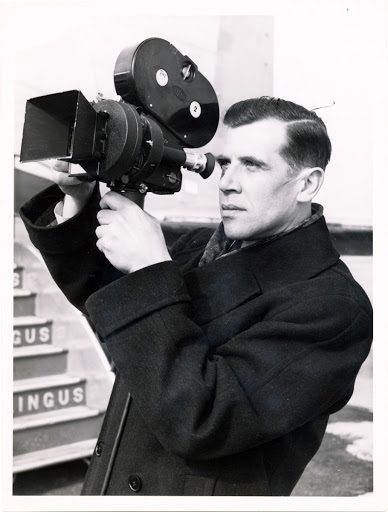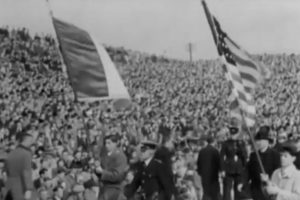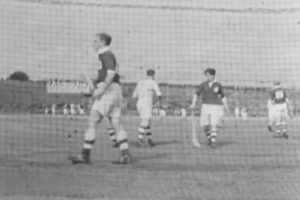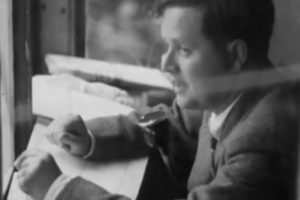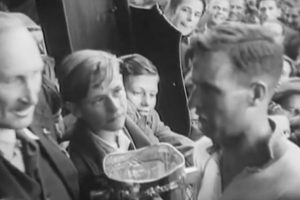1945 Georg Fleischmann
Georg Fleischmann
Georg Fleischmann, along with his camera, crash landed at Dunbratten Head Co. Waterford on 1stApril 1941. He spent several years interned in the Curragh where the situation was quite different from that in most other camps in Europe; the internees were allowed out during the day, bound only by their word of honour to return and attended dances, played golf, even took university courses.
In Germany, he assisted the acclaimed film producer Leni Riefenstahl in making her film of the 1936 Olympic Games and he won a gold medal at the Venice Film Festival in 1939 for his film Styria.
Fleischmann had a movie camera with him when his plane crashed on Dunbratten Head in April 1941; the movie camera was his own property and became a very important factor in his subsequent life in Ireland. Fleischmann became friendly with Dan Breen, the well known veteran of the War of Independence and Fianna Fail T.D. for South Tipperary.
Fleischmann was allowed to remain in Ireland in 1945 due to Breenʼs influence on Eamonn DeValera, head of Government at the time.
In due course he set up a business ‘Hibernia Pictures Ltdʼ with Stanley Moore and began making films for various commercial projects. In 1948 he filmed the All Ireland Hurling final and he filmed the All Ireland Football final in 1952.
Georg Fleischmann is acknowledged as one of the major influential figures in the establishment of the Irish film industry.
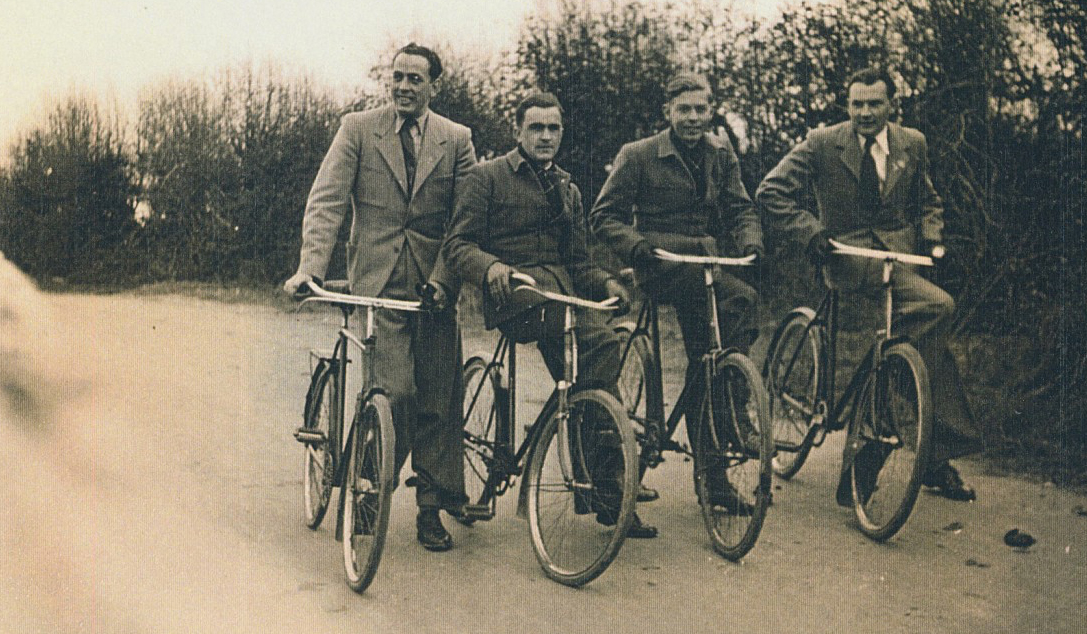
Group of German internee cyclists
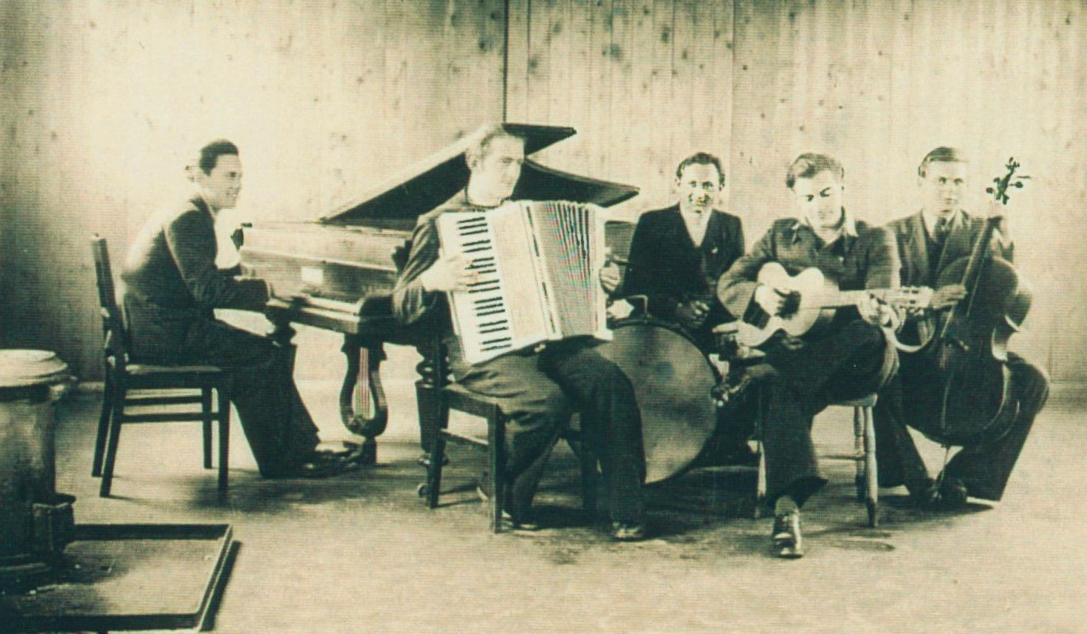
German Internees Band A very popular group on the Curragh Camp
Belligerent Internees
Below is an excerpt from an article on the Allied and German internees based in the Curragh from 1940 to 1945, courtesy of the Royal Curragh Golf Course.
With the outbreak of war in Europe in September 1939 the Irish Government, led by Éamon DeValera, adopted a policy of neutrality and thereby refrained from joining the Allies or Axis powers. This was followed by a declaration of Emergency, which suspended the normal political life of the country. In the event of any of the ‘Belligerents’ landing by sea or air on the territory of the State, it was decided that the air or naval personnel would be interned in specially prepared accommodation at the Curragh Camp, Co. Kildare. Part of the present practice area of the Royal Curragh Golf Club was selected as the site of what became known as the ‘B’ and ‘G’ Camps – the former for Allied internees and the latter for Germans. This area was called ‘K Lines’ at the time the Curragh Camp was built in 1855, when ten wooden barracks were constructed and named in alphabetical sequence from ‘A Lines’ to ‘K Lines’.
Archive footage of the 1948 All Ireland Final.
Georg Fleischmann was one of the cameramen.
Hibernia Pictures
Hibernia Pictures were situated in No 2 Mount Street Upper basement and ground floor which were sublet from Countessa Taaffe. Georg Fleischmann and Stanley Moore were the directors of Hibernia Pictures.
Hibernia Pictures specialised in local documentaries ranging from working with CIE which included sequences of Bus and Tram Transport throughout Dublin City to festivals held in New Ross, County Waterford.
Amongst Hibernia Pictures more notable productions was the filming the 1948 All Ireland Senoir Hurling Final.
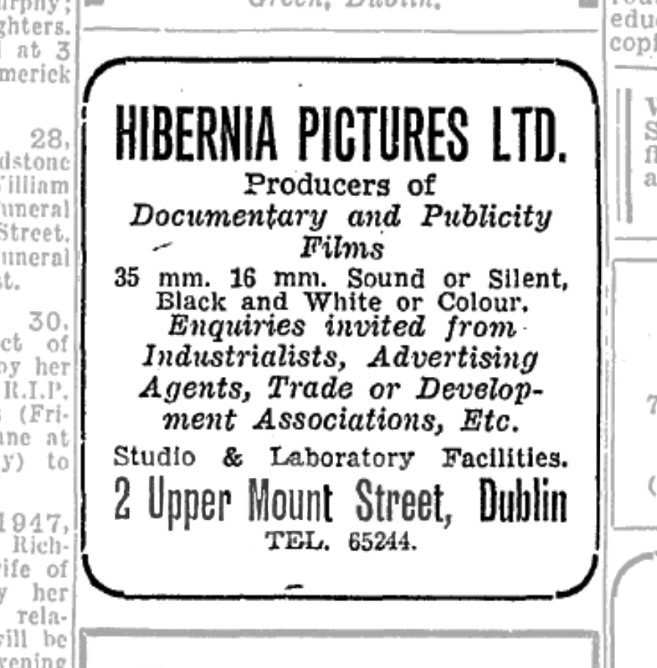
John Stanley Moore
John Stanley Moore was born in Dublin, Ireland, 1924. In 1945 he joined Hibernia Pictures, of 2 Upper Mount Street, Dublin, where he worked in the production of feature films andnewsreels. In 1949 he was employed by Crawley Films as producer-director. In 1957 he accepted the post of production supervisor with McICim Advertising Ltd., of Montreal, and in 1961 he returned to Crawley Films.
J. Stanley Moore, 37, and C. Anthony B. Betts, 38, were killed May 20, 1962, in an automobile accident near Ottawa, Canada. Both men were employees of Crawley Film Ltd., of Ottawa. Mr. Bett was head of the Sound Department and Mr. Moore was head of the TV Commercial Division.

